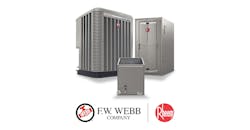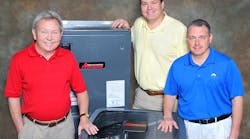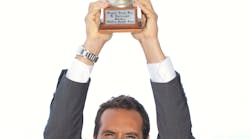Latest from Residential HVAC
‘Hired Gun’ Brings New Business Philosophy to Florida HVAC Business
“This is not my first rodeo,” said a self-proclaimed silver-haired "hired gun."
Business Leader Robert Wilkos joined Roussos Air Conditioning, based in Panama City, Florida, in 2012. Roussos has always been a small business, but they’re starting to see growth spurts in a big way, in the afterglow of hiring Wilkos.
Roussos started in 1983, but its most considerable growth has come over the past 30 months. One reason for the company’s growth? Years of business experience.
“This would be the fourth company I’ve developed in my 43-year career,” Wilkos said.
For sure, Robert Wilkos isn’t new to business and he’s not new to the area, either. One business he developed is less than a mile from where Roussos is located (a circumstance he defines as “awkward”). Even so, the improved business practices at Roussos implemented by Wilkos have helped the company break profit records. For most of Roussos’ existence, annual revenues were under $1 million. Revenue in 2014 hit $2.2 million. Wilkos is forecasting $2.6 million for 2015.
“When you come in the door, you’ve got to be an experienced manager,” Wilkos said. “You’ve got to make sure the process and procedures are in place and build the platforms you can grow. You can’t have the same helter-skelter chaos and expect to double your revenue without expecting more chaos.”
How has Wilkos help cut down on the chaos at Roussos? He’s set the expectations for growth via tracking reports and looking at key performance indicators. In addition, he’s brought a focus to maintenance service plans that he hopes will be of value to both the business and the consumer. These service plans are where Wilkos expects to continue seeing growth in the coming years.
“I believe you typically grow a service company based on those maintenance service plans. That has been the case here too,” he said. “The revenues have increased as the plans went from a total of 170 to almost 950. Our goal this year is 1,200 [service plans], but that to me is how you really develop a solid residential service company.”
A Philosophical Change
Patrick Boykin, owner and sales manager at Roussos, said the philosophical change Wilkos has brought to their business has forced them to pay attention to the details of each decision instead of letting things “just happen.”
“I think that’s where a lot of people get stuck in no man’s land,” Boykin said. “They have five to 10 employees and are struggling with profitability, not really knowing where you’re going. Since we brought in Mr. Wilkos, he’s helped us refine our vision, and where we want to go. He’s providing a good road map of how to get there.”
Before the arrival of Wilkos, Boykin said they thought success meant simply making service calls and finishing up by the end of the day. Now, he realizes how important the maintenance contracts are to profitability. There has certainly been a learning curve over the last couple of years, but Boykin said once learned, work has become simpler.
Efficiency via Small Changes
Many smaller HVAC companies have the same feeling the Roussos staff originally did, according to Wilkos. Business owners in the HVAC industry tend to come up in the field as techs or installers and decide the best way to run the business is to stick with what they know. However, Wilkos said this misses the ability to fully reap the profits.
“If you don’t reap the profits, you probably need to rethink running an AC company,” Wilkos said.
In the case of Roussos, they just “needed somebody to show them the way,” Wilkos said. They needed to think smarter and show them that increasing profitability is hard work, but it doesn’t have to be painstaking or a guessing game. Now, three years later, he said the company does the same thing they did before, just in a much smarter way.
“The processes in place and procedures are better. We’re marketing better. We’re taking advantage of the client database,” Wilkos said. “We’re making a greater effort to reach out. … Let’s say they do a service call for somebody then just sit there until that customer hopefully calls them back instead of proactively marketing them the services they may offer. There has to be some degree of balance there. You don’t want to over market your client base; it might turn them off. But in timely manner t, reach out and touch them every 6 months. It can be helpful for the homeowner and ourselves.”
The internal clockwork of Roussos has improved since Wilkos arrival as well, as there is now more departmentalization. Installation, service and maintenance departments have been added, which Wilkos said allows them develop homegrown service techs and give customers a better product.
Staying On the Minds of People
Another step toward Roussos’ improvement has been marketing. Whether it’s getting more focused on which market see the companies TV ads, signing up with Angie’s List and receiving a Super Service Award from the company (two years in a row) or simply reaching out to more customers, Roussos staff is now far more aware of how to market the right way.
Wilkos’ marketing philosophy has been to track new customers and find out which medium is bringing them into the company, then figure out what the cost is for each new customer. He also wanted to make it easier for customers to pay by accepting all credit cards instead of discriminating due to costs.
“We’re s supposed to make this easy for a consumer,” he said. “Get all that stuff out of the way. Make yourself as easy to do biz with as possible.”
Marketing, from Wilkos perspective, comes down to the finest detail of how techs look. No more t-shirts and cut-off jeans, as that’s likely a poor first impression when showing up at a local grandmother’s door. Employees also need to be receiving training on a consistent basis, he said, so as to know as much as possible about new equipment. It also means being honest with yourself, as many businesses are not easily able to do.
“Any company in biz for a long time, they think the market knows who they are; they don’t,” Wilkos said. “Most companies lack effective marketing. They’re all over map on where they should spend marketing dollars. There’s no strategy to it, they just hope they get market shares.”
Before Wilkos arrived, Boykin said he saw how other companies advertised, and just started trying it without much discipline, leaving the effort quite ineffective.
“It’s the first thing to get shut off when things get tight,” Boykin said. “You don’t realize how important it is to make your mark and impress your brand on the community. We’ve been advertising consistently since 2005, but we’ve seen our market share increase in the last three years. We’ve adhered to a marketing plan, budget and schedule. And it’s borne fruit.”
One form of marketing that has helped Roussos has been cable TV marketing, Wilkos said, as this allowed them to zero in on the zip codes the business services instead of having the commercials all over the state. Wilkos believes TV is the best way to market, even though the Internet is breathing down its proverbial neck. However, even the company’s Facebook page has benefitted, rising from 90 likes in 2012 to nearly 1,900 at present.
The End Game
How long does this “hired gun” plan on staying?
“I’ll let a few more years happen and then go fishing,” Wilkos said. “By that point, the company will have learned to manage the future.”
Boykin agrees, saying that they now know that there must be a purpose and goal to everything they do as a business. They treat sales leads “like gold” and keep track of numbers. It seems, from speaking with Boykin, that they are learning a better way to do business very quickly.
“You’ve got to have a purpose and goal,” according to Boykin. “If you’re just growing for the sake of growing because you want to be more visible in the community, that’s not much of a goal. If your goal is to create a company that is consistently profitable, that has a name for providing excellent service, you’ve got to map it out. Everything else is just going to happen by accident, good or bad. … But if you have a plan and constantly mindful of it, and you’ve got partners or managers holding each other accountable for it, the plan is going to take root.”














